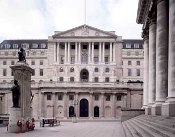The Bank of England (BoE) has increased interest rates by 0.75 percentage points to 3 per cent, it has announced.
This represents the largest single increase in interest rates since 1989 and first time the BoE’s benchmark interest rates have reached 3 per cent since November 2008.
At the meeting of the bank’s Monetary Policy Committee (MPC), committee members voted to raise interest rates by 0.75 percentage points by a majority of seven to two.
One member voted for a 0.5 percentage point increase and another wanted a 0.25 percentage point rise.
The MPC noted that, since its last forecast, there have been “significant developments” in fiscal policy, while some of the certainty around energy prices has fallen due to government interventions.
It added that CPI inflation was 10.1 per cent in September and is expected to rise to around 11 per cent in Q4 2022.
The BoE’s sets its monetary policy with the aim of meeting its 2 per cent inflation target.
Commenting on the announcement, Chancellor, Jeremy Hunt said: “Inflation is the enemy and is weighing heavily on families, pensioners and businesses across the country. That is why this government’s number one priority is to grip inflation, and today the bank has taken action in line with their objective to return inflation to target.
“Interest rates are rising across the world as countries manage rising prices largely driven by the Covid-19 pandemic and Putin’s invasion of Ukraine.
“The most important thing the British government can do right now is to restore stability, sort out our public finances, and get debt falling so that interest rate rises are kept as low as possible.
“Sound money and a stable economy are the best ways to deliver lower mortgage rates, more jobs and long-term growth. However, there are no easy options and we will need to take difficult decisions on tax and spending to get there.”
Discussing the potential impact on the pensions industry, LCP partner, Jonathan Camfield, said the 0.75 percentage point interest rate rise was widely anticipated and priced into the markets, and therefore "there should be little immediate impact on pension scheme finances".
"However, of broader concern to pension schemes will be the evolving worsening economic outlook, including the BoE’s updated core projection of a longer recession lasting throughout 2023 and potentially beyond," he continued.
"This has the potential to impact asset prices, and also to impact the financial strength of companies that sponsor pension schemes. It can also of course be expected to put many pensioners under further financial strain, particularly at a time of high inflation, which also continues to be part of the bank’s expectations for the next 12 months.
"Having said that, whilst there is clearly lots of bad news out there at the moment, it must be remembered that pension schemes generally have never been in a healthier financial position, helped significantly by higher long-term interest rates.”
XPS Pensions Group senior consultant, Charlotte Jones, added: “Analysis by XPS’s DB:UK funding tracker shows that the average UK pension schemes is now in surplus, with the improvement in funding positions largely attributable to rising gilt yields and the repeated lifting of interest rates by the Bank of England.
"In spite of recent market turmoil, since the first interest rates rise in December 2021 approximately £800bn has been wiped off the value of UK DB pension scheme liabilities, which equates to a 35 per cent drop in their value.
"However, the full impact of the market turmoil following the mini budget is not yet known, and some schemes who were forced to reduce their hedging before gilt yields dropped in the latter half of October may yet find themselves worse off or even pushed back into a deficit.”
Latest News
-
OBR analysis reveals potential impact of salary sacrifice changes
-
Strong funding levels continue as endgame landscape reshaped by innovation
-
Harwich Haven Authority Pension Fund finalises £45m buy-in with Royal London
-
GAD publishes LGPS gender pension gap reporting guidance
-
DB scheme funding levels continue to improve heading into 2026
-
News in brief - 6 February 2026
Private markets – a growing presence within UK DC
Laura Blows discusses the role of private market investment within DC schemes with Aviva Director of Investments, Maiyuresh Rajah
The DB pension landscape
Pensions Age speaks to BlackRock managing director and head of its DB relationship management team, Andrew Reid, about the DB pensions landscape
Podcast: From pension pot to flexible income for life

Podcast: Who matters most in pensions?

In the latest Pensions Age podcast, Francesca Fabrizi speaks to Capita Pension Solutions global practice leader & chief revenue officer, Stuart Heatley, about who matters most in pensions and how to best meet their needs
© 2019 Perspective Publishing Privacy & Cookies










Recent Stories